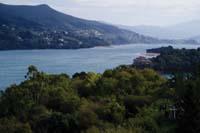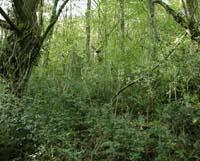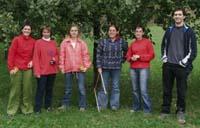Diagnosis of Urdaibai Forests

The first step in measuring the quality of an ecosystem is to obtain a good mapping. In this case they work with maps at scale 1:10,000, quite precise scale if you consider that Urdaibai has 22,000 hectares. In addition, they use aerial photographs or frames of the Provincial Council of Bizkaia. With these photos the spots are drawn on the map. These spots are characterized by their color and each color corresponds to a type of vegetation. To identify and characterize these spots it is necessary to go directly to them. Of course, studying all spots is almost impossible, since studying 22,000 hectares is a very laborious task.
Once the mapping is done, the optimal sampling of the ecosystem is planned, that is, it is determined which minimum percentage of the total surface should be analyzed so that the sampling is representative. They use statistical techniques.
GPS approaches selected sampling points. It measures samples (diameter, height, density), species to which they belong, etc. If they do not know the species, they collect the sample and identify it in the laboratory.
Mathematical formulas

For example, the Shannon index is the most widely used in ecology. The higher its value, the better the quality of the ecosystem in general. However, the quality of an ecosystem is not based solely on indices. The presence of representative species in the ecosystem will also be analyzed. Some species guarantee good ecosystem quality. It is considered that the quality of the ecosystem is good when it presents high rates of biodiversity and representative species.
Robledales in unfortunate state
According to the results obtained so far, the current situation of the oaks in Urdaibai is quite good, while in the case of the oaks is difficult. At least as far as forests are concerned, the oak groves are undoubtedly the most affected by human action. They are scarce and very scattered, in danger of extinction.
Also, the abundance of pine forests generates ecological problems. In addition to reducing biodiversity, the soil is very poor, the land loses fertility.
Soil activity is very important for an ecosystem to be productive. For this reason, Urdaibai soil enzymes are being investigated with a team of researchers from the Neiker research center. Enzymes report soil function or activity. In addition, researchers believe that enzymes present in the soil are directly related to ecosystem diversity.
Another objective of the research is to compare the current situation with that of 20 years ago, how the same ecosystem has evolved. And of course if there have been changes, they want to know what their causes have been and why.






